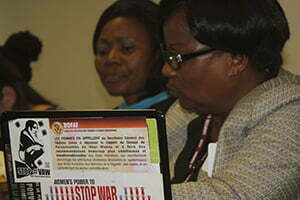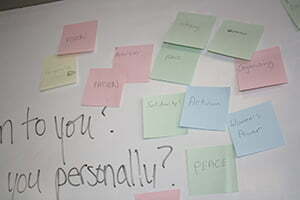After months of preparation and planning, PeaceWomen were thrilled this week to welcome the WILPF delegation to New York to mobilise, advocate, and strategise around the 14th anniversary of UN Security Council Resolution 1325.
Women from Cameroon, Colombia, Democratic Republic of the Congo, Jordan, Lebanon, Nigeria, and Syria joined WILPF international staff at a workshop on 27 October on “Leveraging Women’s Action for Peace,” where we shared our visions of WILPF and had a series of conversations about how we can work together to demilitarise our world and create gender equality and peace.
WILPF Workshop Highlights
Leaders brought attention to how it is critical to address root causes of conflict and violence prevention for UNSCR 1325 to be meaningful and effective.
Some of the highlights included the following quotes:
“Companies are making money off of arms. Why are we the dumping ground? How do they dare? How dare we people allow this to happen?”
“The only losers in this war are the people. They will lose everything. Finally, these people who fight will sit at the table – not me, not my grandmother, not my daughter – they will sit and they will share the country, the money, the cake.”
“Stop with all of the agendas! The international community could end the war in Syria. Saudi Arabia could stop providing arms. Russia could stop supporting the regime. The international community could stop the war. But they don’t think of us, they don’t think of the millions of refugees and internally displaced people living below standards of life. No one thinks of us. They only think of what they will win.”
“When can we really have peace? What would happen if the international community really cared? What would happen?”
“I am ready to die for peace.”
“Before, knowing about other cases of war was fuzzy and vague; but now it means you: it has become more human.”
“We need a Global Action Plan for complete feminist conflict transformation.”
“Civil society should never give up putting a political solution on the table. The only solution is a political solution.”
The workshop was a potent demonstration of the vision, determination, creativity, and power that women peace leaders bring to the table.
Up Next
As we engage with the annual Open Debate on Women, Peace and Security, and participate in the myriad side events, meetings, and consultations – from Boko Haram, to Iraq/Syria and the Middle East North Africa region to the UN Women consultations on the 2015 Global Review of UNSCR 1325. We will continue to amplify the voices of these women peace leaders and demand accountability, action, and change.
Get Involved!
We invite you to join us in asking your government to strengthen prevention through committing and taking action on disarmament and women’s participation and rights.
If you are in New York, you can participate in one of our events. Wherever you are, follow our updates on Facebook and Twitter with hashtags #UNSCR1325 and @Peace_Women or @WILPF.
Are you participating in advocacy around UNSCR 1325 or have you in the past? If so, feel free to share your experience in the comments below. We would love to hear from you.






